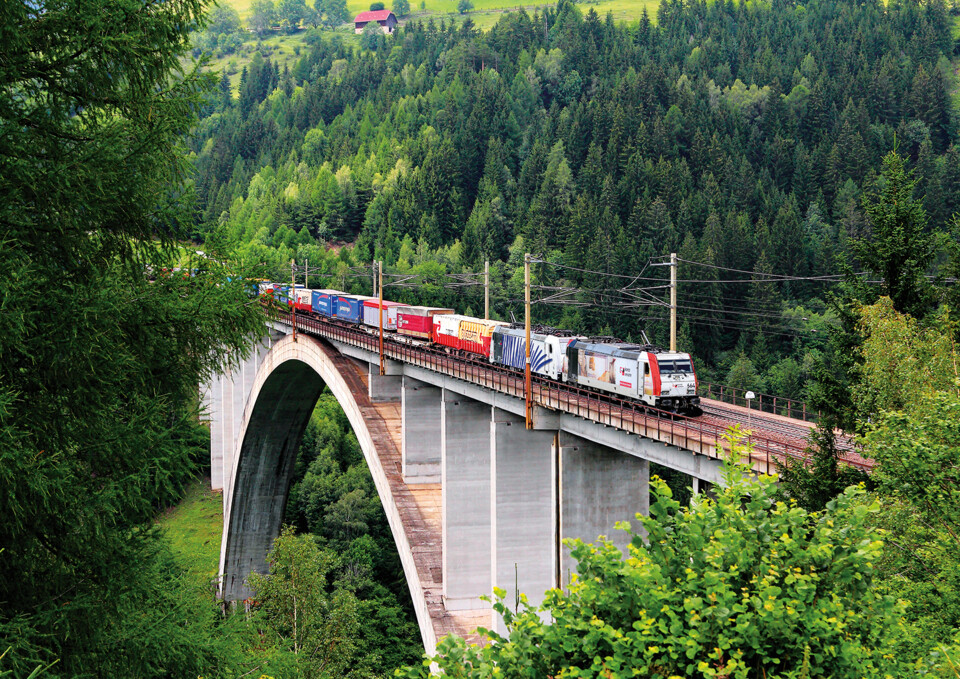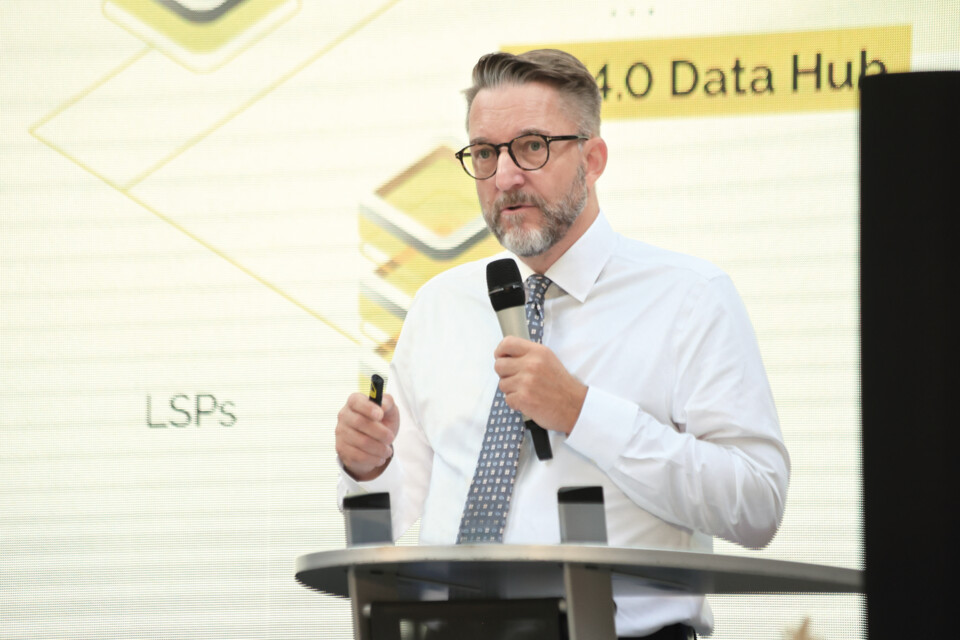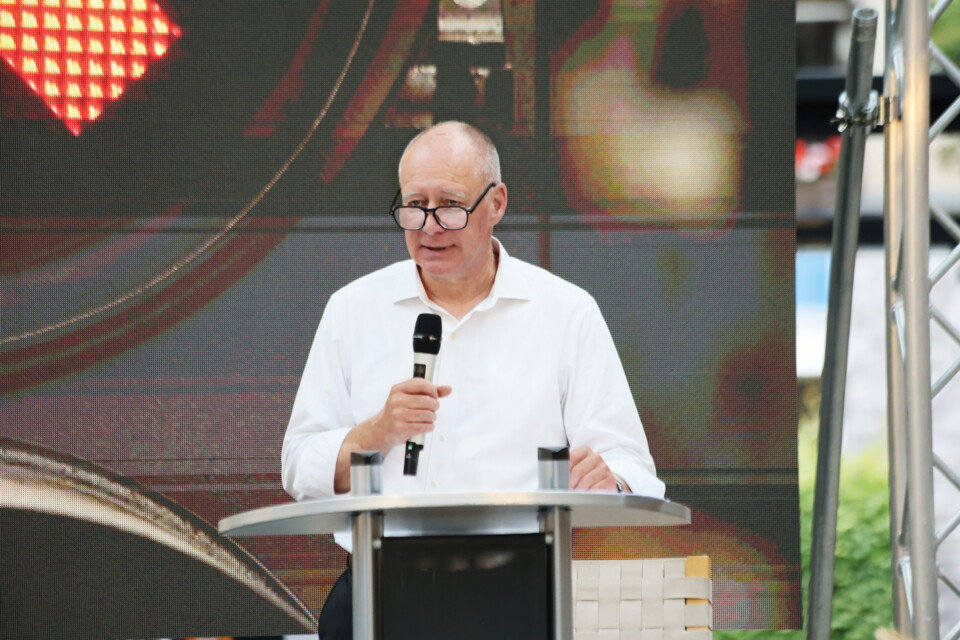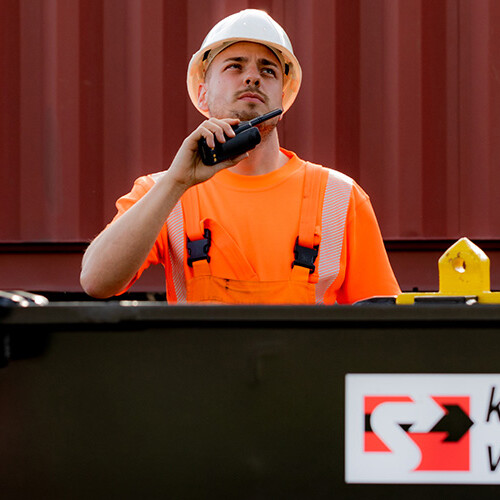2023 financial year: 815,467 truckloads shifted from road to rail
Kombiverkehr KG senses German government turning its back on climate protection in transport sector
- The federal government's modal shift target is moving into the distance
- Transport ministry jeopardising the future of Combined Transport
- Kombiverkehr countering crisis through intelligent network control and digitalisation
- Despite difficult conditions, consignment volumes stable in April and May 2024
(Frankfurt/Main, 20 June 2024) Despite announcements to the contrary, the German government is continuing to move away from its climate protection targets in the transport sector. This is being felt particularly by railways and Combined Transport, as the management of Kombiverkehr KG explained when delivering its results for the 2023 financial year. “Constant rises in train path charges, the discontinuation of the train path subsidy and the refusal of the federal government to pay for the additional costs associated with the upgrading of the high-speed corridors are toxic for the modal shift targets,” said managing director Armin Riedl. The 2023 financial year had already been a challenging one, with only 815,467 truckloads (one load corresponds to the capacity of a truck-trailer combination), or 1.63 million TEU, having been shifted from road to climate-friendly rail. At today’s partners’ meeting, the Administrative Board and the management team set out the reasons for the overall decline of 15.9 per cent in transport volumes, the current trend in consignments, new transport services, IT projects and, above all, the risks in service purchasing from 2025.
Kombiverkehr KG was unable to repeat the positive trend in shipped consignments from preceding years in the 2023 financial year. With a total of 815,467 truckloads (one load corresponds to the capacity of a truck-trailer combination), or 1.63 million TEU, there was a 15.9 per cent drop in the overall number of containers, swap bodies and semitrailers transported compared with the year before. Within the two National Transport and International Transport business units, consignment volumes came to 186,856 truckloads (-10.1 per cent) and 628,611 truckloads (-17.5 per cent) respectively. “Nevertheless, we have been able to come through this year of crisis with the company relatively unscathed. Working in close cooperation with our service partners, we have maintained train operations with no significant limitations thanks to intelligent network control,” said managing director Armin Riedl, commenting on the performance last year. The company turned over EUR 435.2 million from its business activities in intermodal transport, EUR 27.5 million less than in the previous year. After deducting all taxes, a net loss of EUR -332,000 was achieved for the 2023 financial year.
The weakening economy throughout Germany and Europe, with far-reaching falls in production, had just as much of an impact on the trend in consignments as the often unpredictable service quality offered by the railways. This did not reach the level required for the satisfactory delivery of intermodal transport, mainly due to the engineering works on the German infrastructure. Punctuality rates of around 70 per cent were achieved again in a few weeks of summer 2023, but service levels dipped well below this mark in the spring, autumn and winter, with average monthly figures of less than 50 per cent. “We are more than unsatisfied with this quality of service, because that makes it even harder for forwarders to plan their operations. On their side, better reliability can only be achieved by deploying more equipment and personnel. To be able to participate in combined road-rail transport at all, forwarders and transport companies are having to bear the associated additional costs themselves. That simply cannot and should not be the case,” said joint managing director Heiko Krebs, who also called on politicians to continue providing financial assistance for users of the Combined Transport system.
Higher purchase terms for traction services and rising production costs for railway undertakings caused by the need to divert services made general conditions in the last financial year even more difficult. This was exacerbated by months of strike action in France, the wage disputes between the EVG and GDL on the one side and Deutsche Bahn on the other, the closure of the Gotthard base tunnel and the halving of the train path price subsidy at the end of 2023. “The challenges for operators and forwarding customers were and remain many and varied. That is why we find it difficult to understand why the train path price subsidy is being cut at this time. The efficiency gains from targeting funding with a view to significantly increasing the market share of rail transport in order to achieve CO2 savings in the future are likewise thus being lost,” said Krebs of the measure taken by the German transport ministry.
Transport volumes stabilising
In April and May 2024 Kombiverkehr posted an increase in volumes, on some routes exceeding the level of consignments for the same months the previous year. “We are seeing the first signs of an improvement in demand again and, thanks to a full range of train services, a stabilisation in transport volumes overall,” Riedl stated. “Nevertheless, the transport sector is suffering from a shortfall in orders from industry. There are some tentative indications, however, that the German economy could now be finding itself at a turning point. We are therefore cautiously optimistic for the immediate future, and we will continue to fight with our partners for better conditions in our transport segment so that these first signs of further growth are not snuffed out again.”
Challenges: Train path prices, corridor upgrades and changed service purchasing
In Combined Transport the development of production costs will continue to be challenging in the next few years, particularly in the light of the planned corridor upgrades, which provide for a total of 40 sections of track to be fully overhauled by 2030. “The financial impact on railway undertakings, operators and forwarders was recently quantified. The fact that only passenger transport is receiving financial support to defray the additional costs incurred through upgrading the high-speed corridors, while freight transport is left completely empty-handed, is a further indication that the German government has probably turned its back on climate protection in the transport sector,” Krebs said. The same applies for the train path price increase of more than 16 per cent in 2025, with the federal government halving the train path price subsidy at the same time. These two measures together will leading to a doubling of the costs of using track, which will put Combined Transport under additional pressure at a time when the economy is already in difficulty.
For the 2025 financial year, Kombiverkehr expects a significant increase in expenses for purchased services caused by a large provider. "We are therefore forced to look for alternatives, which can succeed in principle, but is difficult to realise in a very short period of time. This can be achieved for the majority of transport operations. However, at the moment there is still a need to find market-driven solutions that are also viable for Kombiverkehr for around a third of the consignment volume in the short term," says Riedl, describing the current situation. "If we don't succeed in doing this, in the worst-case scenario we will stop transport," Riedl also points out the consequences for the transport sector. "We have discussed this with the Federal Minister and his office on several occasions. We have called for support for a transitional period. Unfortunately, all efforts have so far been unsuccessful. The federal government's modal shift target is thus moving further into the distance."
Fully digital customer journey
By linking forwarding customers both to web-based portal solutions and via B2B interfaces, Kombiverkehr is accelerating the digital transformation and standardising business processes and information flows in transportation activities. “Combined Transport has one key point of difference from other industrial sectors: if transport is to be organised and operated successfully, a large number of companies have to cooperate and keep each other reliably informed. That is why Combined Transport is per se a cooperative product and we are working on common industry goals that will enable us to exchange data at a consistently high quality level,” Heiko Krebs said. “We have set ourselves the goal of turning Kombiverkehr into a digital operator and realising a fully digital customer journey that improves the simplicity, efficiency and reliability of Combined Transport. This is what we are working towards every day.”
One example of this is the new CT4.0 data hub, which has been in operation since March 2023. It is being marketed with partners through DX Intermodal. Some major haulage customers are already making successful use of the new platform, with many others in the technical preparation stage. It is based on the EDIGES 4.1 data exchange format. All the transport information that used to be provided through CESAR-Next is now being exchanged, and today more than 2,000 users are working digitally with Kombiverkehr through the web-based myKOMBIVERKEHR portal. Since it went live in March 2023, the portal has been expanded with email services, a dedicated area for storage fees, a preview of engineering works and delivery and release codes. The company is also in the process of automating terminal access procedures with the aim of further accelerating terminal handling times through the use of modern digital technologies.
New services to and from Benelux and southeast Europe
Some areas of transport are to be expanded permanently with new train products. Among these are Benelux services, with the CT operator increasing its network advantage even further with the Köln-Eifeltor – Rotterdam RSC v.v. route, launched in March 2024. Köln-Eifeltor is one of the largest hub terminals in Germany and offers many national and international options for forwarding, such as to and from France, Spain, Italy, Slovenia, Turkey and Greece. In addition, the timetable to and from Benelux is to be supplemented with a new direct connection between Belgium and Spain at the beginning of autumn. In transport to and from southeast Europe, Kombiverkehr has boosted transport services to and from Serbia with the integration of the terminal in Niš into the network. At the same time, the company is repositioning itself from this central location directly on the pan-European transport corridor 10 for expansion of the network to other countries in southeast Europe.
Forwarding customers make a significant contribution towards reaching the climate goals set out in the European Green Deal
The total quantity transported on Kombiverkehr trains fell from 22.87 million gross tonnes in 2022 to 19.11 million tonnes in the 2023 financial year (-16.4 per cent). Forwarders and logistics companies which used the company’s intermodal products to carry their trailers, containers and swap bodies relieved trunk roads of more than 678 million kilometres driven by vehicles and 15.89 billion tonne-kilometres, while the distance covered rose slightly from 830 to 832 kilometres. All of them thus made a significant contribution towards reaching the climate goals set out in the European Green Deal. With more than 3,200 daily journeys on environmentally-friendly rail, 1.19 million tonnes of harmful greenhouse gases were avoided over the course of 2023.
2023 key figures of Kombiverkehr KG at a glance:
- Total truckloads transported: 815,467
- International truckloads: 628,611
- National truckloads: 186,856
- Total consignment volume in TEU (Twenty-Foot-Equivalent Unit): 1.63 million
- Savings in carbon dioxide emissions in tonnes compared with end-to-end road transport: 1.19 million
- Transport volume in gross tonnes: 19.11 million
- Average transport distance: 832 km
- Goods volume in tonne-kilometres (tkm): 15.89 billion
- Sales in EUR: 435.2 million
- Employees: 150
The 2023 annual report offers an extensive presentation of the business results of Kombiverkehr KG. It can be downloaded here.

A challenging 2023 financial year: Kombiverkehr KG maintained its train operations in close coordination with service providers. In the end 815,467 containers, swap bodies and semitrailers were transported on climate-friendly road, achieving sales of 435.2 million euros.

Heiko Krebs, General Manager: “We have set ourselves the goal of turning Kombiverkehr into a digital operator and realising a fully digital customer journey that improves the simplicity, efficiency and reliability of Combined Transport.”

Armin Riedl, General Manager: “The federal government's modal shift target is thus moving further into the distance.”

